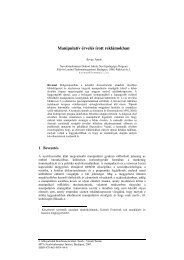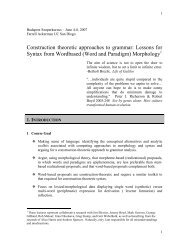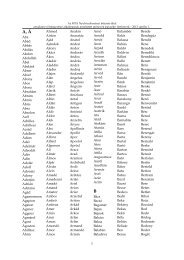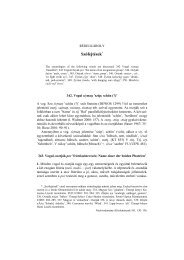Nyelvtudományi közlemények 91. kötet (1990)
Nyelvtudományi közlemények 91. kötet (1990)
Nyelvtudományi közlemények 91. kötet (1990)
Erfolgreiche ePaper selbst erstellen
Machen Sie aus Ihren PDF Publikationen ein blätterbares Flipbook mit unserer einzigartigen Google optimierten e-Paper Software.
The Origin of<br />
Mordvin M saba, E zaba 'child'<br />
and Cheremis sußo<br />
In Mordvin, there is a word meaning 'child', mdM saba, E zaba, that<br />
corresponds to the Cheremis form sußo. For this word no satisfactory etymology<br />
has so far been presented. In this article I will suggest a new explanation<br />
of its origin. While working on the article, I hâve had the opportunity to<br />
discuss différent problems pertinent to the question with Sirkka Saarinen at<br />
the University of Turku and Ingvar Svanberg at the University of Uppsala<br />
and I would like to express my gratitude for their valuable help.<br />
According to Potapkin-Umjarekov (1949) mdM saba means 'child' and<br />
is synonymous to the word idi. Also Juhász (1961. 163) has mdM saba 'child'.<br />
From Erza Mordvin Koljadenkov-Cyganov (1949) hâve zaba 'child' and the<br />
same word is quoted also by Evsev'ev (1931. 31), who also has the word in a<br />
différent phonetic form in one of his examples: son sabadonza lama 'he has<br />
many children'.<br />
The Cheremis form corresponding to this Mordvin word is sußo, but<br />
it exists almost exclusively as part of the Compound iye-sußo (Paasonen-<br />
Siro 1948). The Compound consists of iye 'the young of an animal' and<br />
sußo (cf. Galkin 1978. 43 who gives phonetic variants of the words). This<br />
Compound is known in several différent phonetic variants —more or less<br />
transparent — in the collections of the Cheremis dictionary at the University<br />
of Turku. The word is known all over the Cheremis area and among the<br />
examples of the dictionary the following could be quoted: iksußo (Birsk),<br />
i:ja -su ja (Sernur), i-ya-snißn (Jaransk) and ikXsa (Kozmodemjansk; all the<br />
forms notations by Wichmann).<br />
For Mordvin M saba, E zaba and Cher. sußo Paasonen (1897. 51) suggests<br />
Mishar Tatar origin. He reports having heard a Mishar Tatar man<br />
using a word zaba, which would mean 'dwarf'. Such a word would, he says,<br />
show a striking similarity with Arabie "säbb Jüngling, junger mann" and<br />
obviously his idea is that we hâve to do with an Arabie word transferred<br />
Nyelvtudományi Közlemények <strong>91.</strong> <strong>1990</strong>.


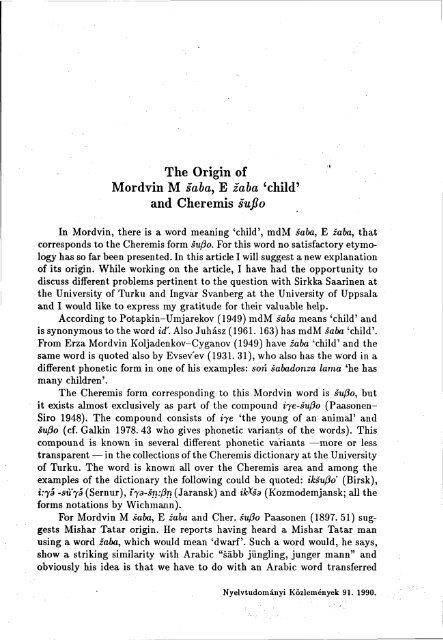
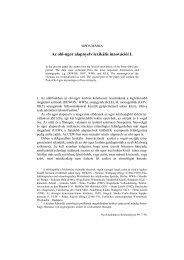
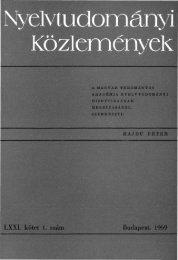
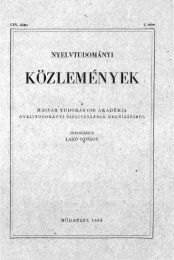
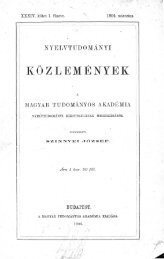
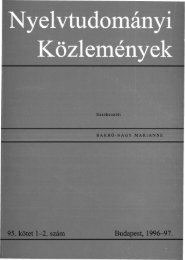
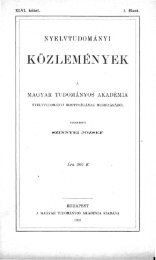
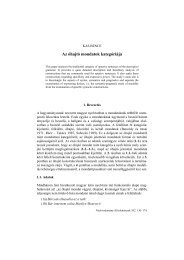
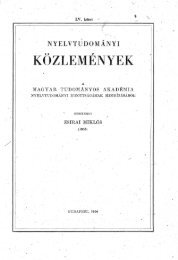
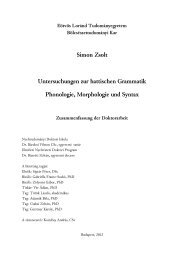
![Gósy Mária: A [p, t, k] mássalhangzók zöngekezdési ideje Bevezetés ...](https://img.yumpu.com/15682849/1/190x245/gosy-maria-a-p-t-k-massalhangzok-zongekezdesi-ideje-bevezetes-.jpg?quality=85)
